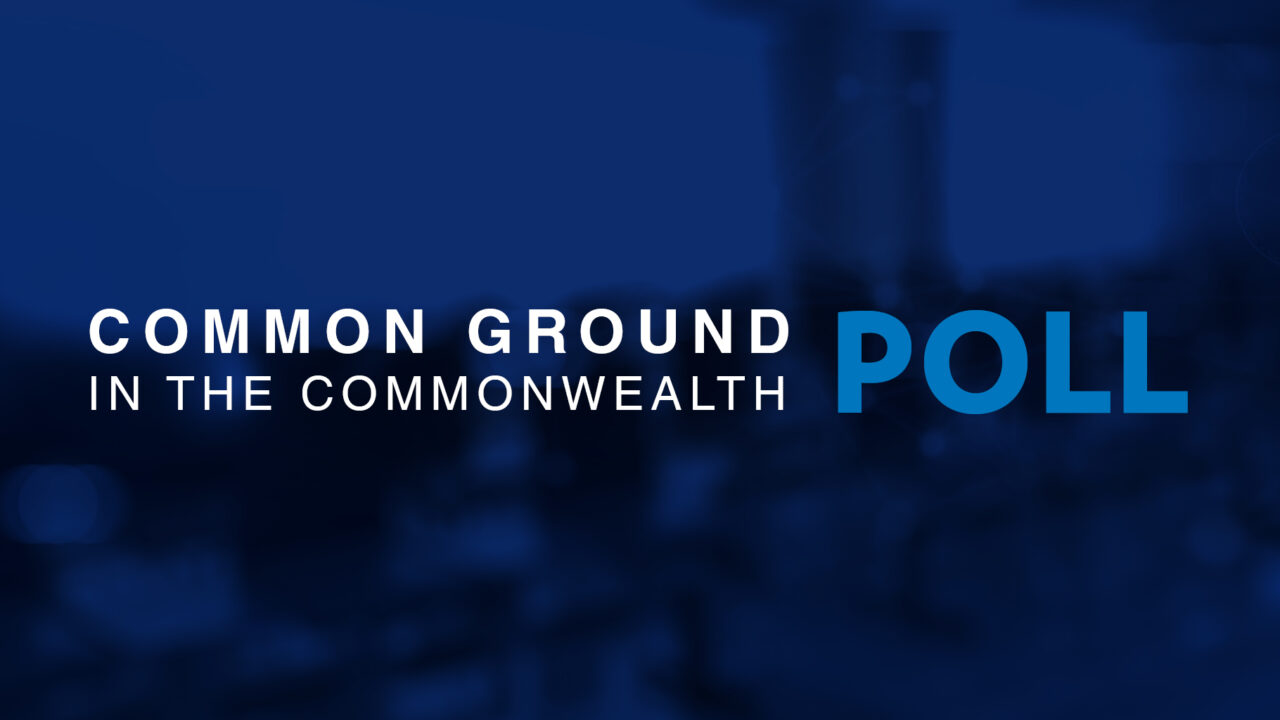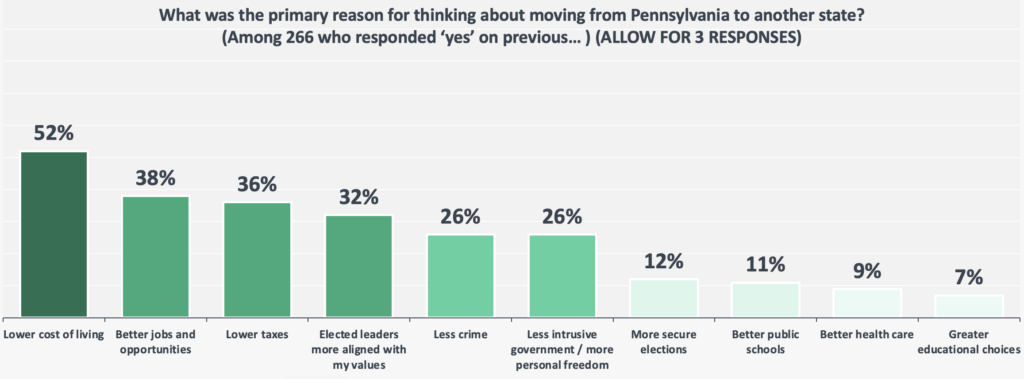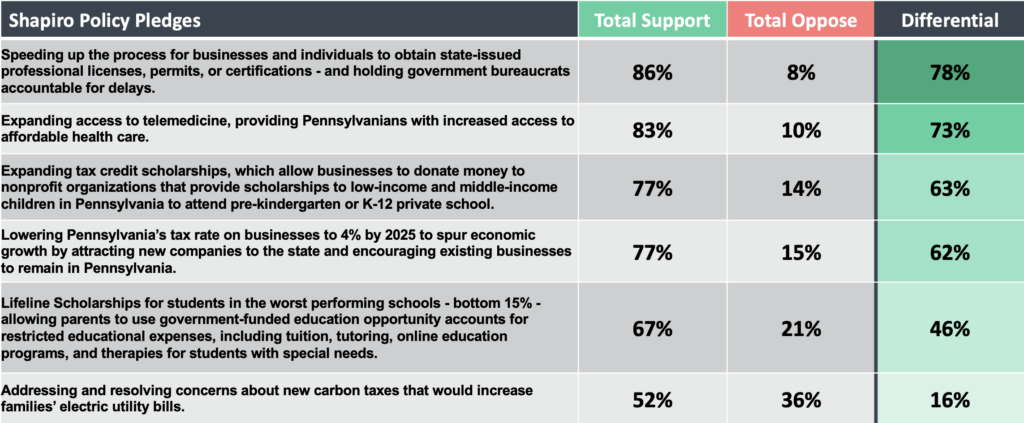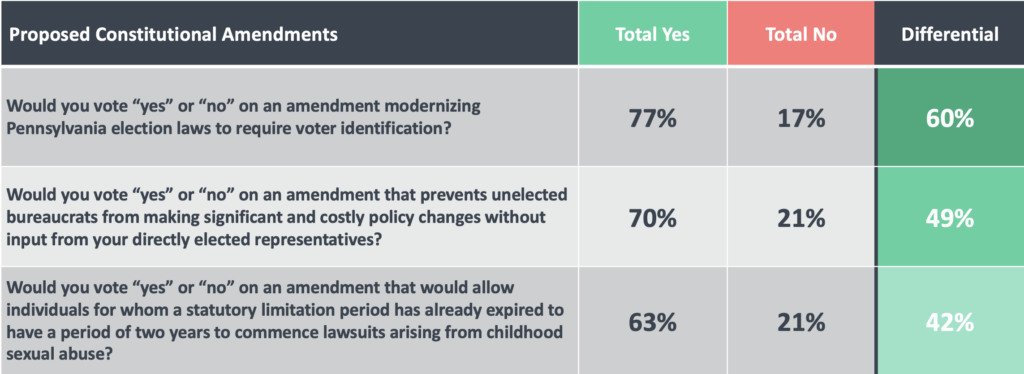Memo

Common Ground in the Commonwealth Poll Findings
Summary
The Common Ground in the Commonwealth Poll, conducted March 24-29, is the first in a series of quarterly surveys taking the pulse of voters on the “state of the state” and tracking insights, opinions, and attitudes on key issues facing Pennsylvanians. The first iteration surveyed 600 registered Pennsylvania voters on the economy, ballot measures, education, and other state policy initiatives. By assessing results and values on a quarterly basis, as well as year-over-year, Commonwealth Foundation is ensuring that the opinions of Pennsylvania voters are at the forefront of policy conversations in Harrisburg.
Results from the March poll indicate that Pennsylvanians have doubts about the trajectory of the state. Only 27 percent of Pennsylvania voters believe the state is going in the right direction (61 percent say the state has “gotten off on the wrong track”), with 23 percent saying inflation is the biggest problem facing Pennsylvania. (Seventy-two percent believe the country has “gotten off on the wrong track.”)
Although people are pessimistic about their financial futures (65 percent believe that “economic conditions in Pennsylvania are getting worse” for them personally), the survey revealed positive views of several bipartisan measures promoted by Gov. Josh Shapiro during the 2022 campaign. This includes 77 percent support for lowering Pennsylvania’s business tax to 4 percent by 2025 and 77 percent support for expanding tax credit scholarships.
Jobs and the Economy
- 23 percent of voters said that inflation is the biggest issue facing the state. 40 percent said “inflation and recent price increases impacted [their] household’s ability to maintain [their] standard of living” a great deal. 31 percent said a “fair amount.”
- Crime and rising violence (12 percent) and the state economy (9 percent) were also identified as top issues.
- 44 percent said they have, or know someone that has, considered leaving Pennsylvania for another state. Of this group, 52 percent said a lower cost of living was a primary reason. Interestingly, among those who would relocate to another state if they could, the top relocation state considered was Florida (26 percent).
- Over half of voters (53 percent) said they are economically worse off than they were two years ago, and 65 percent believe that economic conditions continue to worsen. Merely 24 percent of voters rated Pennsylvania’s economic conditions as “good” or “excellent.”
- A majority of respondents (53 percent) said they believe Pennsylvania state taxes are too high when compared to other states.
- Only 13 percent of voters ranked Pennsylvania’s economy as “among the best” or “better than average” when compared to other states.
Bottom line: Pennsylvanians are still reeling from inflation and other economic fallout from the pandemic. Voters feel that they are worse off than before and are pessimistic about their personal finances and the state’s economy in general.

State Policy
- Voters expressed support for several bipartisan proposals touted by Governor Shapiro on the campaign trail:
- Speeding up the process for businesses and individuals to obtain state-issued professional licenses, permits, or certifications—and holding government bureaucrats accountable for delays (86 percent support).
- Expanding access to telemedicine; providing Pennsylvanians with increased access to affordable health care (83 percent support).
- Expanding tax credit scholarships, which allow businesses to donate money to nonprofit organizations that provide scholarships to low-income and middle-income children in Pennsylvania to attend pre-kindergarten or K-12 private school (77 percent).
- Lowering Pennsylvania’s tax rate on businesses to 4 percent by 2025 to spur economic growth by attracting new companies to the state and encouraging existing businesses to remain in Pennsylvania (77 percent).
- Lifeline Scholarships for students in the worst performing schools—bottom 15%—allowing parents to use government-funded education opportunity accounts for restricted educational expenses, including tuition, tutoring, online education programs, and therapies for students with special needs (67 percent support).
- Addressing and resolving concerns about new carbon taxes that would increase families’ electric utility bills (52 percent support).
Bottom line: Bipartisan reforms that Governor Shapiro campaigned on, such as tax credit scholarships, Lifeline Scholarships, and business tax reforms, are supported by an overwhelming majority of voters.
Question: You will now read a list of bipartisan measures supported by Governor Shapiro during his campaign. After each, please indicate if you support or oppose Governor Shapiro and lawmakers in Harrisburg working across the aisle to enact these measures in 2023.

Ballot Measures
State lawmakers in Harrisburg are proposing a number of amendments to the Pennsylvania Constitution that, if passed by the General Assembly, would go before voters in a ballot referendum that voters can vote yes or no on.

- Surveyed individuals indicated support for the constitutional amendment process, with 59 percent agreeing that “amending the state constitution provides ample checks and balances because it puts proposed amendments directly to voters.” Only 26 percent believe the ballot process “erodes checks and balances because it doesn’t require the governor’s signature.”
- Voters overwhelmingly support proposed ballot measures, including voter identification requirements (77 percent), increasing legislative oversight of the bureaucracy (70 percent), and extending the statute of limitations for childhood sexual abuse survivors (63 percent).
Bottom line: Voters support the constitutional amendment process. Proposed constitutional amendments related to election security and legislative oversight of the bureaucracy have strong support.
Education
- Voters do not rate Pennsylvania’s K-12 education system highly; 66 percent gave the system a “C” grade or worse.
- An overwhelming majority of voters (77 percent) agreed with the statement: “Pennsylvania has arbitrary school district boundaries that traditionally force underprivileged students into underperforming schools. All kids should have access to the best public schools, regardless of location.”
- If finances were not a concern, 53 percent of respondents said a private school would provide their child with the best education.
- Voters believe that school districts should be required to use excess reserve funds before raising local taxes (82 percent).
Bottom line: Pennsylvanians are not satisfied with the state’s K-12 education system. Most parents believe that private schools give their children the best educational opportunities.
Federal Policy
- 40 percent of voters approve of President Biden’s job performance; 58 percent disapprove.
- 46 percent have a favorable opinion of Sen. John Fetterman; 48 percent have a favorable opinion of Sen. Bob Casey.
- A majority of Pennsylvania voters (59 percent) believe the federal government has “too much power.”
- A focus of dissatisfaction with federal policy is the U.S. tax code, with 84 percent of voters agreeing “the federal tax code is rigged with loopholes and complex regulations that only benefit the politically well-connected and people who can afford accountants and tax lawyers.”
- 68 percent say the amount of federal taxes they pay is “too high.”